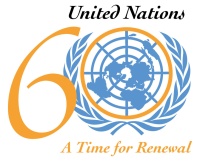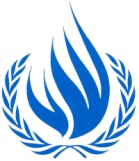

Human Rights Field Operation in Serbia
UN OHCHR
Omladinskih brigada 86
11 070 - Belgrade, Serbia
Tel: (+381 11) 3185 828
Fax: (+381 11) 3185 872
E-mail: Ova adresa el. pošte je zaštićena od spambotova. Omogućite JavaScript da biste je videli.
Web sites:www.un.org.yu, www.ohchr.org
Minutes
Human Rights Contact Group Meeting
held in Belgrade on 21st September 2006
Place: Belgrade, OHCHR premises
Date: 21st September 2006
Time: 11,00-13,00
Participants:
NGO representatives:
Vesna Petrović (the Belgrade Center for Human Rights),
Lidija Vučković (Center for Human Rights Niš);
Miodrag Shrestha (Group 484),
Ivanka Kostić (Praxis);
Sonja Biserko and Isabela Kisić (Helsinki Committee in Serbia);
Staša Zajević and Nevzeta Josifović (Women in Black);
Milan Antonijević (YUCOM);
Djurdjica Zorić (Bibija)
Katarina Ristić (the Humanitarian Law Center)
OHCHR representatives:
Paul Miller (Head of Priština Office), Jadranka Koceic (Officer in Charge of the Belgrade Office), Mihajlo Lukic and Dragan Lalosevic (Belgrade Office).
OHCHR offices from Belgrade and Priština convened a meeting in Belgrade inviting relevant human rights NGO’s from Serbia to discuss the Human Rights Committee’s Concluding Observations for Kosovo and Serbia proper, to facilitate the inclusion of the civil societies’ rule of law and transitional justice initiatives in agenda of an ongoing negotiation process for the final status of Kosovo. OHCHR translated into Serbian and forwarded to all invited parties the Human Rights Committee’s Concluding Observations for Serbia and Montenegro (adopted 2004) and for Kosovo (adopted 2006).
OHCHR Belgrade was the facilitator of the meeting.
In addition to Human Rights Committee’s Concluding Observation, OHCHR proposed the Report of the Secretary-General from 2004: “The rule of law and transitional justice in conflict and post-conflict societies”- as a useful framework for the discussion and possible civil society activities. To this end, OHCHR’s representatives referred to the recommendations from the report of the SG as far as negotiations, peace agreements and Security Council mandates are concerned, particularly one relating to the civil society involvement, which reads as follows: “Avoid the imposition of externally imposed models and mandate and fund national needs assessment and national consultation processes, with the meaningful participation of Government, civil society and key national constituencies to determine the course of transitional justice and restoration of the rule of law” (emphasis added).
OHCHR representatives briefly presented the Concluding Observations for Kosovo, emphasizing the following:
- Continued impunity enjoyed buy some perpetrators of war-crimes and crimes against humanity as well as ethnically motivated crimes, including those committed in March 2004.
- Fate of missing persons and effective investigation of all outstanding cases of disappearances and abductions and bringing perpetrators to justice.
- Low number of non-Albanian returnees and the inability of displaced persons to recover their property.
Representatives of the NGOs stated, inter alia:
That a shadow report (regarding UNMIK’s report) was submitted to the Human Rights Commitee by Praxis in 2006. Attention was called to problems in regard to property issues – namely the Housing and Propert Commission’s decisions being final with no legal remedies available; regaining possession over owned property; access to courts particularly in cases of inherited property and refusal of courts in Kosovo to accept documentation issued in Serbia; delays of more than one year in issuing case registration numbers in civil suits; archives in chaos (diplomas, work and pension files etc.); courts’ minutes issued, as a rule, in Albanian and the process of translating them (usually of very poor quality) into Serbian takes a minimum of six months.
The best cooperation between NGOs from Serbia and Kosovo has been achieved by the womens’ organizations. The Women’s Peace Coalition, which is comprised of the Kosovo Women’s Network and the Women in Black Network Serbia has been established. They launched a women’s peace platform. The coalition monitors Belgrade-Pristina talks on the future status of Kosovo and makes recommendations in that regard calling for a more pronounced participation of women in the process.
The Women lobby group for Balkans has been formally established in July this year in Zagreb and had a meeting two weeks ago in Vienna, where Kosovo issues were discussed. Special attention was given to work with the population in the enclaves, the aim being to discourage a possible exodus of remaining Serbs from Kosovo by pointing out to them what they may gain and what they may loose if they decide to leave – at least to postpone their decision to leave for one year in order to see how the developments in the coming months may affect them. A suggestion was discussed that a confidence building Task Media Force be established which would publish daily messages, interviews and information from Serb and Albanian sources.
Few participants indicated that some of the Concluding Observations were too broad stating that in the case of discrimination the forms of discrimination should be clearly recognized and the sub-categories of victims, especially of those most vulnerable, should be introduced. It was noted that gender discrimination and family violence should be treated separately. Attention was called to continued ignoring of the recommendation of the Parliamentary Assembly of the Council of Europe that non-Albanians whose last residence was in Kosovo, should not be returned from their present countries of residence in the West.
Another issue was raised, namely that inadequate attention was given to the citizenship issues.
Impunity for war crimes and problems connected to witness protection (for example, in the Krasniqi case a witness was murdered). The absence of cooperation between Belgrade and Pristina in this regard represents a serious impediment to processing these crimes. The upcoming trial before the court in Belgrade, scheduled for October 2006, for the crime committed in Suva Reka, will be a challenge for this cooperation.
The NGOs expressed their view that the initiative to include the civil society in the negotiating process is a useful one and it was agreed that each of the NGOs present at the meeting forwards its recommendations to OHCHR by September 29th, which would than compile a single document that would, upon approval by the NGOs, be sent to UNOSEK.


